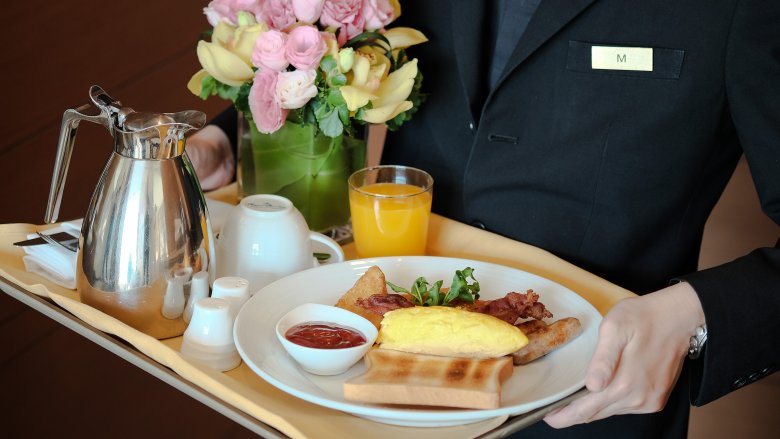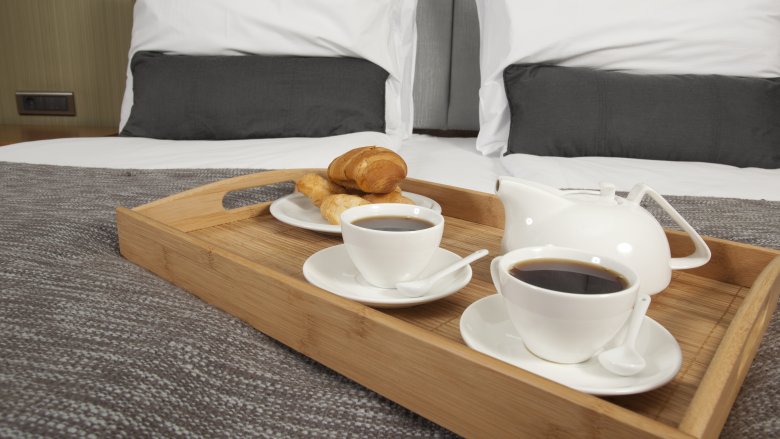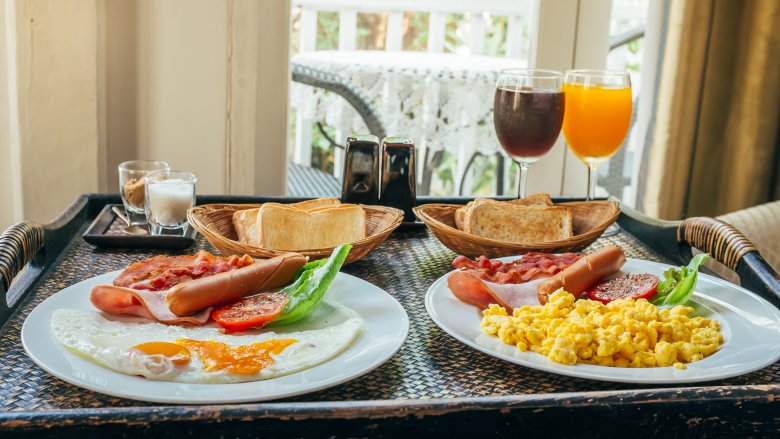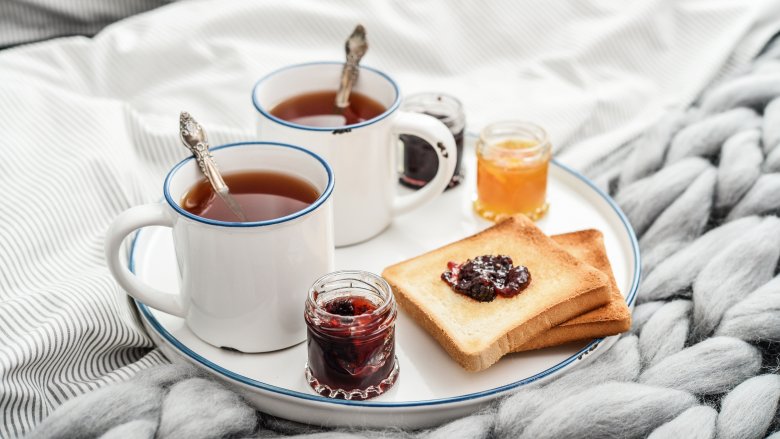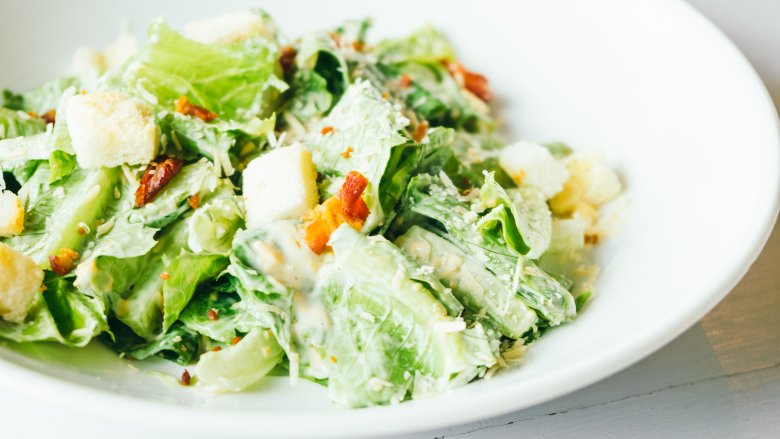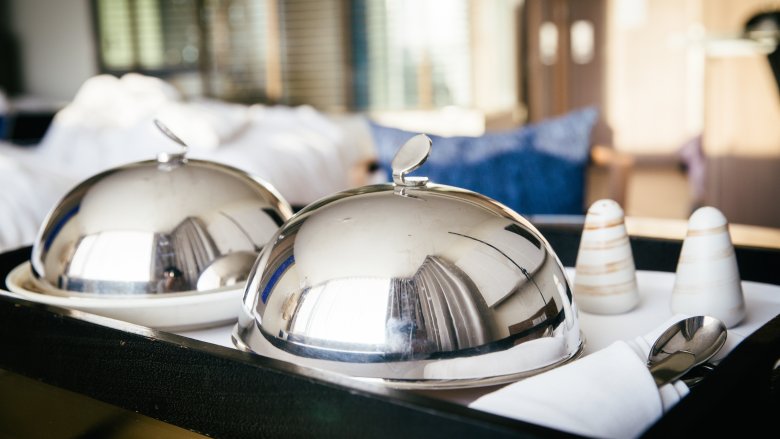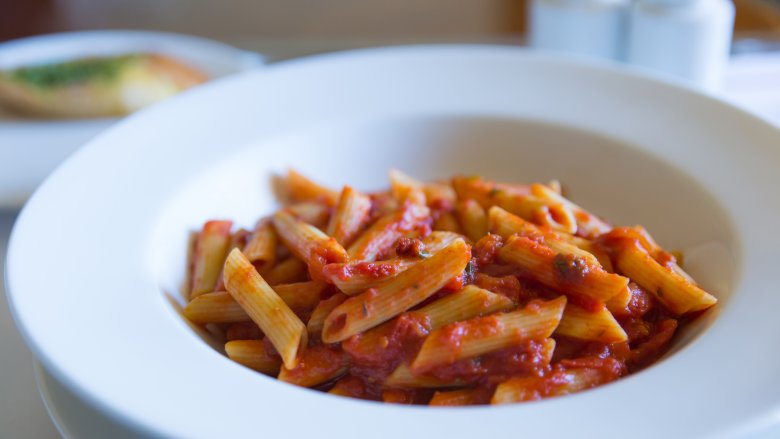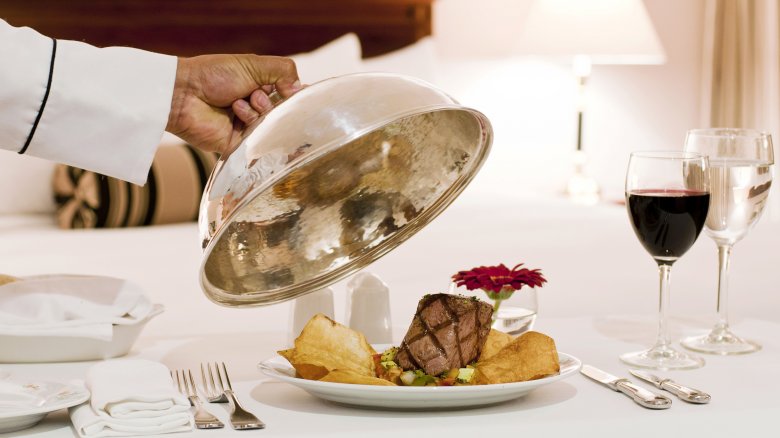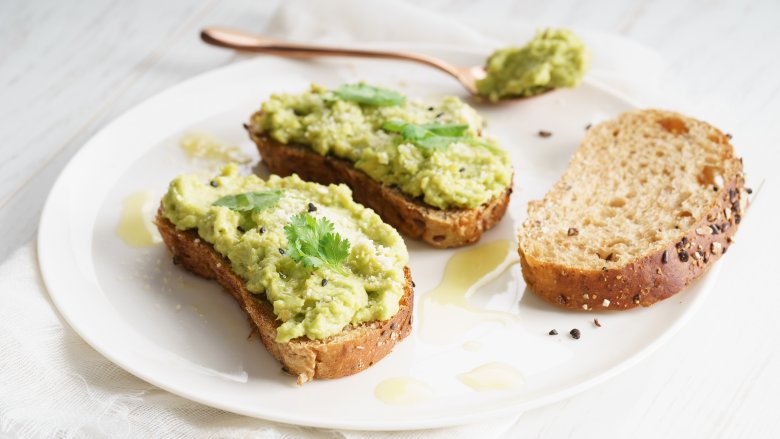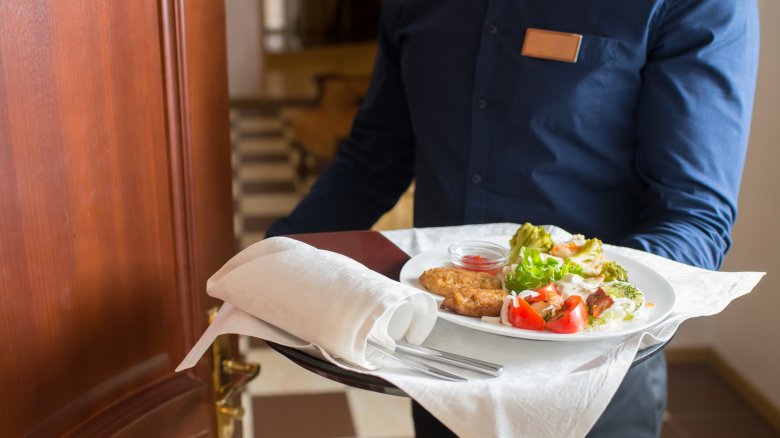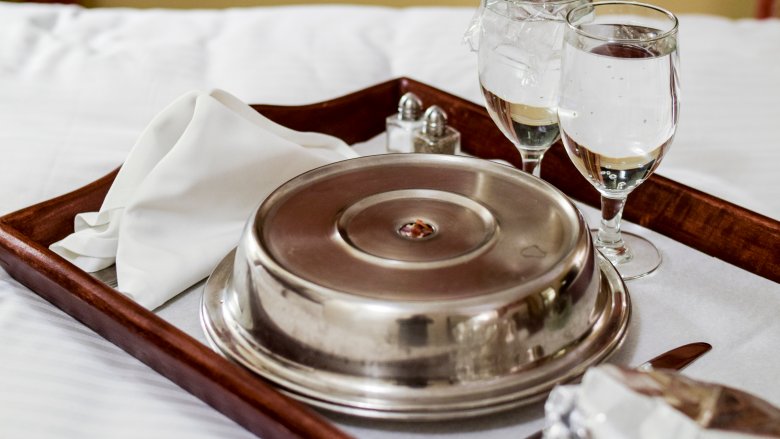The Worst Things To Order From Hotel Room Service
It's always nice to be pampered when you're staying in a hotel, and at the end of a long day nothing sounds better than to kick off your shoes, change into your pajamas, and eat a meal from the comfort of your hotel bed, where you don't even have to worry if your greasy french fries stain the white sheets.
That room service siren song gets us every time, with its promise of a delicious meal delivered straight to our door, no effort required on our parts. But nine times out of ten, that meal is anything but delicious, and from bite one it's instant regret. If it's supposed to be hot, it's probably cold, if it's supposed to be cold, it's probably room temperature, and if it's supposed to be crisp, it's probably soggy. Of course, some foods suffer more than others, but unless you know exactly what to order, chances are you're going to be very disappointed with your meal (especially when you see your bill).
To stand even the smallest chance of a successful room service experience, these are the menu items you'll want to avoid.
Coffee
If you're an "I need caffeine the instant I open my eyes" kind of person, you might tempted by room service coffee. And why not? You can even fill out that handy door hanger menu that guarantees a piping hot cup of joe at the very same time your alarm goes off. It's a genius move, really — unless you actually like decent coffee.
The problem here is two-fold. For one thing, you're getting seriously ripped off — Men's Journal reports that veteran hotel GM Anthony Arbeeny calls room service coffee the "all-time No. 1 profit generator." Aside from that, not only is the coffee likely sub-par quality, but that sub-par quality coffee has been sitting in huge urns for who knows how long. See, there's a reason coffee houses brew a new batch of drip coffee every 30 minutes without fail — it's because if it sits any longer than that, it tastes stale or burnt.
And bad news, even if your coffee is being delivered in a French press, chances are it's that same old urn coffee with some grounds thrown in to make it look authentic. Talk about adding insult to injury.
Eggs
You might not know this, but there is a proper way to prepare for eating eggs: Your plate must be immediately adjacent to your pan, and your fork must be within reach, preferably already in your hand if you can swing it. This way, the second your eggs have reached desired doneness, you can tip them onto your plate and go to town. No, you do not have time to mosey over to the table — you must eat them where you stand. It might sound dramatic, but cold eggs are no laughing matter.
And that's exactly why you don't want to order them from room service. Think of how long those eggs will be sitting before they reach their final destination. By the time you dig in, scrambled eggs will be cold and rubbery, and fried eggs will be greasy with congealed yolks. Need more convincing? Think about how bad the eggs are that you get from a buffet table, and then remember that those have at least been kept warm in a chaffing dish. Those poor room service eggs don't even get the benefit of a chaffing dish.
Toast
Toast seems like a safe room service order, until you remember that toast's best quality is its toastiness. You know... that perfectly crisp, golden brown loveliness? The way the top layer crackles just a little as you spread softened butter over it? The way the edges have a slight crunch that gives way to a slightly softer middle? That toastiness.
Room service toast will have none of that, because after it popped out of the toaster it sat on a tray for approximately 75 years. If it comes to you already buttered, you're chowing down on a cold and soggy slice. If it comes to you unbuttered, then it will have actually morphed into melba toast as all its remaining moisture got sucked out during the wait. Chances are also good that the butter will be nearly frozen, so good luck spreading it.
And if that isn't reason enough not to order room service toast, remember that those two slices of bread probably cost as much as you'd pay for two whole loaves in a grocery store — decidedly not worth it.
Eggs Benedict
Eggs Benedict sounds like the ideal room service breakfast order — it's fancy enough to feel like a splurge, and it's complicated enough that you probably don't regularly whip it up at home. But it's not the ideal order. You do not want room service eggs Benedict.
There are three components to this dish, all of which suffer on their journey to your hotel room. Let's start at the bottom with that once-toasty English muffin, which is carrying the weight of a poached egg and a ladleful of Hollandaise sauce. After it spends more than five minutes in the room service holding pattern, it's going to be one sad, soggy slice of bread. Next you've got the poached egg, whose perfectly runny yolk starts setting within minutes of being plated. Forget any hope of a liquid yolk — you're lucky if it's not chalky by the time you cut into it. And last, that creamy Hollandaise sauce, made almost entirely of egg yolk and melted butter, which starts congealing almost instantly. But hey, by all means, if soggy English muffins, hard-cooked poached eggs, and crusty Hollandaise sauce are what you're in the mood for, order eggs Benedict.
Breakfast in general
When it comes to room service breakfast you might be thinking, "Jeez, I can't order coffee, or eggs, or toast — what the heck can I order?" The short answer is: Nothing, really.
Let's take a look at a sample room service menu from Hilton hotels, as an example. A three-ingredient omelet? That'll set you back a jaw-dropping $24. And you can throw in a glass of orange juice for the bargain price of $8. Assorted Kellogg's cereal? You're not going to believe this — it's $12. But bonus, you do get your choice of milk. To add berries or (or, not and) bananas to that cereal? An extra $4. That's $16 for a bowl of cereal, friends.
Exorbitant prices aside, Men's Journal reports that breakfast is actually the worst time to order room service, and that's due to demand. Lisa Brefere, a former hotel chef, says that by a landslide the most room service orders come in at breakfast time. According to Brefere, lunch only accounts for one percent or less of orders, and dinner accounts for 30 percent. That means the kitchen is completely overwhelmed in the morning, and dishes end up sitting way longer than they should. Whose mouth is watering for that $24 ice cold omelet with a $12 half grapefruit?
A dressed salad
When you're hosting a dinner party, there's a reason that you don't toss the salad ahead of time, right? You wait for your guests to arrive, you might even wait for them to be seated — then you toss the salad. Otherwise, you toss it too soon and you end up with limp, soggy greens.
Which is exactly why you should never order a salad from room service — unless you specify that you want your dressing on the side.
While some salads, like those made with iceberg or romaine lettuce, will hold up a bit better than others once dressed, more tender greens like spring mix or spinach will start to wilt immediately. Since you have no way of knowing just how long that plate is going to be sitting before it finds its way to your room, it's best to order a naked salad and do the dressing yourself, no matter what kind of greens are involved.
Fried foods
It's 10 p.m. and you've been dreaming about a hamburger and heaping pile of crispy fries for hours. You finally pull the trigger and make the call. Sometime later, a plate is delivered to your door, and because that it's been covered, the food is actually still warm. But wait... one bite of your burger reveals a soggy bun. And the fries haven't fared any better. You can thank the lid for that.
Skipp Worden, Executive Chef at the Westin Jekyll Island, explains to Southern Living, "Vented lids cause crispy fried items like fries, onion rings, or even fried shrimp to get soggy from the steam." He says you can request for your order to be made "extra crispy" but even that doesn't guarantee against the dreaded sog factor.
Fried foods aren't the only menu items that suffer under those domes. Kelly Merritt, author of The Everything Family Guide to Budget Travel, advises against steamed vegetables, too. "Items like broccoli, and even squash, and carrots sweat under a hospitality cover and become nothing more than flat colors on a plate by the time they reach a guest room," she says. Look at the bright side: Now you have a good reason to skip the veggies.
Pasta
When you're perusing the room service menu, you might assume that a simple pasta dish is a good option (never mind the fact that you're probably paying around $20 for 12 cents worth of noodles). What could go wrong with room service pasta, you ask? A lot.
Bravo spoke with chefs to get the scoop on what to avoid when it comes to in-room ordering, and Bradford Phillips of Troquet River North in Chicago's Hotel Felix says pasta is a big "no." "By the time it gets from the kitchen to the room it's either sticky or cold or the sauce has totally fallen apart. Good pasta is meant to be enjoyed immediately and if you order from room service you're going to be paying a lot for a really subpar product," he explains.
And as if sticky or cold or broken sauce isn't bad enough, imagine what happens to that pasta as it sits steaming under a domed lid. What might have started as al dente spaghetti will likely be an overcooked, mushy mess by the time you take a fork to it. All good reasons not to place that order.
Seafood
No matter how tempting that room service menu makes a fish dish sound, do yourself a favor and skip it, if for no other reason than so you don't wake up to day-old fish smell. Even if you relegate your tray to the hallway, that pungent odor is likely to hang around your room for some time.
Fish stench aside, former hotel chef Lisa Brefere told Condé Nast Traveler there's another reason to avoid room service seafood. "[Fish] doesn't travel well, and it smells," she cautions. "Plus, you don't know how long it's been sitting there. Order something like a turkey sandwich, where you know there has been high turnover."
As for shrimp cocktail? That's not a safe bet either. Brefere says that the dish "could have been pre-made hours ago from barely defrosted bulk-bought shellfish." Doesn't paying somewhere in the neighborhood of $15 for maybe six barely defrosted bulk-bought shrimp and probably bottled cocktail sauce sound delightful?
Steak, unless you know this trick
If you've ever ordered a room service steak medium rare, you were probably very disappointed when you cut into it to reveal meat that was decidedly not medium rare.
Remember those domed lids that cause fried foods to lose their crispness? They're to blame for your overcooked steak, too. In the steak's case, the lids trap all the heat and it just keeps cooking. The longer it sits, the farther from your requested doneness it's going to be.
Mental Floss spoke with a hospitality specialist who confirmed, "If you order a steak medium, it will probably be medium well by the time it gets to you." But there is a trick to getting a perfectly cooked steak (or as close to perfect as room service steak can be, anyway): Order its doneness one degree lower than you really want. In other words, to get a juicy, still pink in the middle medium steak, order it medium rare. Or risk steak jerky. Your choice.
Ingredients that oxidize
When you're paying a premium for a room service meal, you expect it to not only taste good, but to look good, too. As they say, you eat with your eyes first. That's why you'll want to avoid any dishes that contain ingredients which are prone to oxidation.
Two examples: Pesto and avocado. Both will suffer from oxidation when left out, meaning they turn an unappetizing shade of brown when exposed to air.
In the case of pesto, the oxidation process isn't just unsightly, it also causes a loss of flavor. And pesto without a punch isn't good for anything. As for avocados, there's nothing uglier than the gray-brown layer that forms on top of guacamole or mashed avo on toast. But does it affect the taste? Food52 did a deep dive into this question, and found that brown avocado can taste bitter, but just how bitter depends on who's tasting it. Monte Nesbitt, an Extension Program Specialist at the Texas A&M AgriLife Extension, explained, "There can be some loss of eating quality as the [oxidation] process continues, although perceptions of these bitter flavors vary among people."
Anything hot, if you're past the sixth floor
The views might be better from the 30th floor of a hotel, but you're probably not going to get a hot meal at those heights.
That's why former hotel chef Lisa Brefere cautions against ordering any hot food if you're staying above the sixth floor. Room service orders are destined to be ice cold by the time they make their way up to your room from the basement where they're likely cooked.
Likewise, she told Condé Nast Traveler that bad weather — and the resulting overwhelmed kitchen staff — is another reason to stick to cold orders only. "You can really get screwed when there's horrific wind or snow storms," Brefere says. "You're hammered in every room, so everyone in the hotel comes to the kitchen to help out, even the front of house manager." While that might sound like a nice display of teamwork, having the front of house manager with no culinary training prepare your food probably isn't going to result in a five-star meal.
Anything at all?
All the quality issues aside, there's one very good reason to skip room service altogether: The overall quality (and again, those insane prices).
For the convenience of not having to put on pants (though you really should put some on for the sake of room service staff), you're charged some hefty fees. On top of that, you're probably also being charged a higher price than what you could get if you just put those pants on and wandered down to the hotel restaurant.
Food critic John Mariani, told USA Today that room service prices "are usually somewhat higher [than hotel restaurant prices] plus they add a massive service charge and very often, a gratuity." That explains why one single egg might cost $4.49 (yes, really).
But for that inflated price, you can at least expect the same fresh restaurant-quality food, right? Not necessarily. Mariani explains that room service dishes are "usually not made from the same quality of ingredients. For example, it will be chicken roll versus freshly roasted chicken. Or it has been prepped in advance as much as possible. There is usually a separate brigade of cooks, most of whom loathe being on room service duty, especially at 3 a.m." Tack on the extra time that not-so-fresh food takes to get to you, and it's an expensive recipe for disaster.
